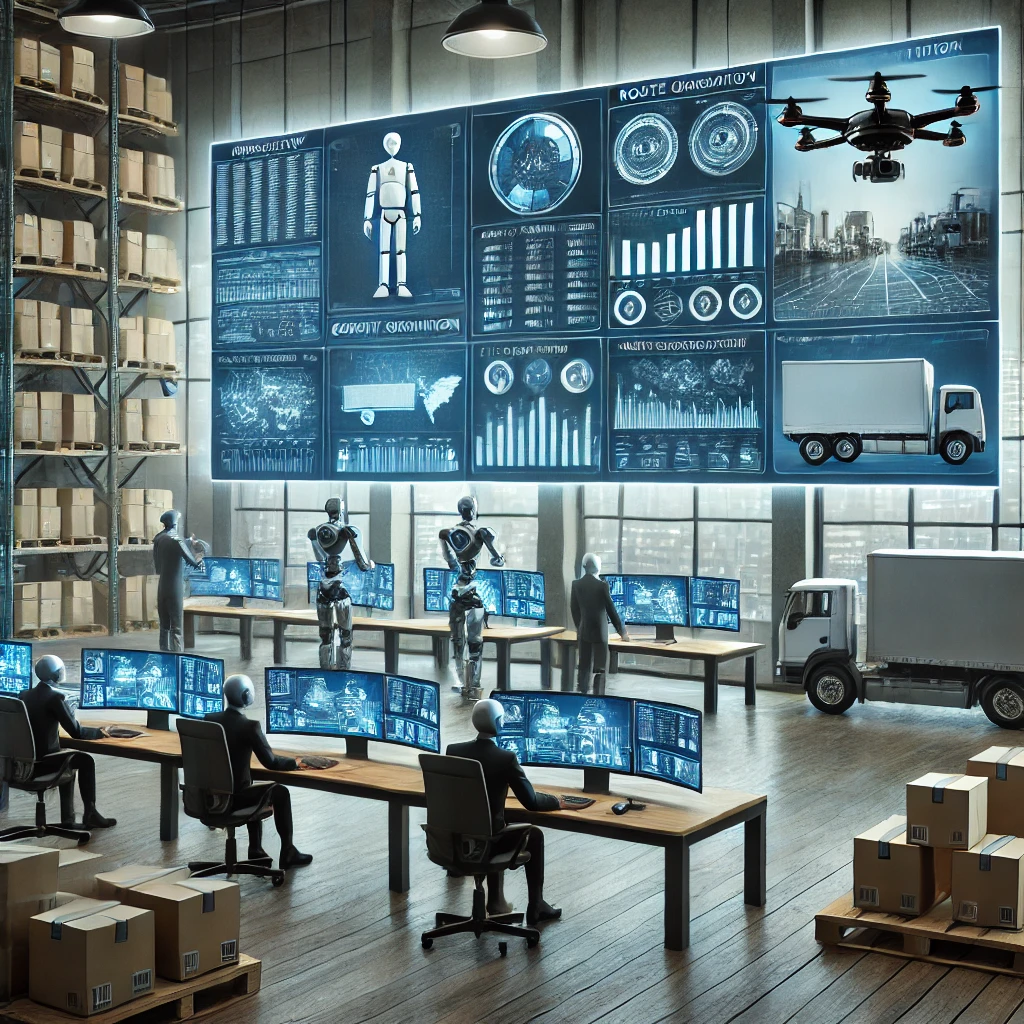How Logistics Automation is Revolutionizing Freight Companies

The Importance of Automation in Freight Logistics
Before diving into the specific ways automation is being applied in logistics, it’s essential to understand why automation is necessary. Traditional freight operations often rely on manual processes, which can be slow, error-prone, and expensive. The pressure to deliver goods faster and more efficiently, combined with increasing customer expectations, has made it clear that businesses must embrace technology to remain competitive.
Some of the main drivers behind the push for logistics automation include:
- Increased efficiency: Automation allows for faster, more accurate operations with fewer errors.
- Cost savings: By reducing human labor and minimizing mistakes, automation helps companies lower operational costs.
- Customer expectations: Customers increasingly expect faster delivery times and real-time visibility into their shipments, which automation can facilitate.
- Scalability: As freight companies grow, automation helps them manage larger volumes of shipments with greater efficiency.
Now, let’s dive into the main areas where automation is transforming freight companies.

1. Warehouse Automation: Improving Storage and Handling
One of the most significant impacts of logistics automation is in warehouse management. Automated systems, including robots, drones, and conveyor belts, are being used to streamline operations within warehouses, making them faster and more efficient.
- Robotics: Automated robots are now used to pick, pack, and sort items within warehouses, reducing the need for manual labor and increasing the speed of fulfillment. These robots can work around the clock without fatigue, improving throughput.
- Automated Storage and Retrieval Systems (ASRS): ASRS uses software-controlled systems to store and retrieve products automatically. These systems are highly efficient and accurate, significantly reducing storage and retrieval times.
- Drones and UAVs: Drones are increasingly used for tasks like inventory management and surveillance within warehouses. They can perform stock checks and locate missing products, ensuring greater accuracy and reducing human errors.
Benefits for Freight Companies:
- Faster and more accurate order fulfillment.
- Lower operational costs through reduced manual labor.
- Improved warehouse space utilization.
2. Route Optimization and Dynamic Scheduling
Route optimization is another area where automation is having a transformative impact. Using sophisticated algorithms and real-time data, automation can help freight companies plan the most efficient routes for deliveries. These systems consider factors such as traffic patterns, weather conditions, delivery windows, and vehicle availability to generate optimal delivery schedules.
- Predictive Analytics: Automation platforms use predictive analytics to anticipate delays and suggest alternative routes to avoid congestion or disruptions.
- Dynamic Scheduling: Automated systems can dynamically adjust schedules based on real-time changes in conditions. For example, if a delivery is delayed or if an unexpected traffic jam occurs, the system can automatically reroute shipments to ensure timely deliveries.
Benefits for Freight Companies:
- Reduced fuel consumption by optimizing delivery routes.
- Faster delivery times due to more accurate scheduling.
- Reduced carbon footprint through more efficient route planning.
3. Real-Time Tracking and Visibility
In an era of customer-centric services, providing real-time tracking information is essential for freight companies. Automated tracking systems have made it easier for freight companies to offer clients complete visibility into their shipments.
- GPS Tracking: GPS technology allows for real-time monitoring of shipments, enabling both freight companies and customers to know the exact location of their goods at any given moment.
- IoT (Internet of Things): IoT-enabled sensors are being used to track shipments’ condition, such as temperature, humidity, and shock. This technology helps ensure that sensitive goods, such as perishable items, are transported safely and within required conditions.
- Automation Dashboards: Freight companies can utilize automated dashboards to consolidate data and provide real-time visibility into all aspects of the shipment process, from the warehouse to the final destination.
Benefits for Freight Companies:
- Improved customer satisfaction with accurate tracking updates.
- Reduced risk of damage or loss with real-time condition monitoring.
- Enhanced operational transparency for better decision-making.
4. Automated Freight Billing and Documentation
Managing freight documentation and billing can be tedious and prone to errors, but automation can simplify and streamline these processes. Freight companies are increasingly using automated systems to handle tasks like generating invoices, customs documentation, and proof of delivery.
- Electronic Bills of Lading (eBOL): By digitizing Bills of Lading, freight companies eliminate paper-based documentation, reducing administrative workload and errors.
- Automated Invoicing: Automated systems can generate accurate invoices based on the shipment’s details, ensuring faster billing cycles and reducing the risk of mistakes.
- Customs Automation: Automated systems can help with the preparation and submission of customs documentation, ensuring compliance with international regulations and speeding up customs clearance.
Benefits for Freight Companies:
- Reduced administrative workload through automation of billing and documentation.
- Fewer errors in documentation and invoicing, improving cash flow and customer satisfaction.
- Faster customs clearance, enabling quicker delivery times.

5. Artificial Intelligence and Machine Learning for Decision-Making
Artificial intelligence (AI) and machine learning (ML) are also becoming integral to logistics automation. These technologies enable freight companies to make more informed decisions by analyzing large volumes of data and generating actionable insights.
- Predictive Maintenance: Machine learning algorithms can analyze historical data from vehicles and equipment to predict when maintenance will be required. This reduces downtime, improves fleet utilization, and prevents costly breakdowns.
- Demand Forecasting: AI can help companies predict demand trends by analyzing data from multiple sources. By accurately forecasting demand, freight companies can better plan capacity, staffing, and inventory.
- Smart Routing: AI-driven routing systems can adjust in real-time to optimize routes based on live traffic data and other dynamic conditions, ensuring more efficient deliveries.
Benefits for Freight Companies:
- Increased operational efficiency through data-driven decision-making.
- Proactive management of fleet and equipment maintenance.
- Enhanced ability to predict market trends and adjust capacity.
6. Autonomous Vehicles and Drones
While still in the early stages, the use of autonomous vehicles and drones for freight transportation is rapidly gaining traction. Companies like Amazon, UPS, and others are testing autonomous trucks and delivery drones to streamline their freight operations.
- Autonomous Trucks: Self-driving trucks are expected to reduce the need for human drivers, lower fuel consumption, and increase delivery speeds. Autonomous vehicles can also be utilized for long-haul freight, where human drivers might need to rest or be limited by hours-of-service regulations.
- Delivery Drones: Drones are already being tested for small package delivery. They have the potential to reduce the last-mile delivery costs significantly and help reach remote locations more efficiently.
Benefits for Freight Companies:
- Reduced labor costs and dependency on human drivers.
- Faster, more efficient deliveries, particularly for last-mile shipping.
- Potential for 24/7 operations, improving delivery speed and flexibility.

Conclusion
Logistics automation is no longer a futuristic concept but a present-day reality that is revolutionizing freight companies worldwide. From warehouse automation and route optimization to real-time tracking and predictive analytics, automation is driving efficiency, reducing costs, and enabling faster, more reliable deliveries. As technology continues to advance, freight companies that embrace automation will be better positioned to meet the demands of their customers, stay competitive, and lead the way in the logistics industry.
By investing in automation and adopting the right technologies, freight companies can streamline their operations, improve their bottom lines, and provide superior service to customers. The future of freight logistics is automated, and those who act now will be at the forefront of this transformative shift.
